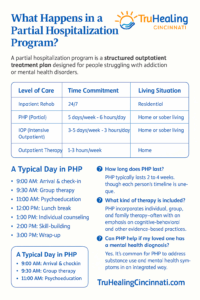When you’ve reached the point of saying “Yes, we need help,” there’s often a new wave of uncertainty: What does help actually look like? Partial hospitalization programs (PHPs) can sound intense or confusing—but in reality, they’re designed to provide exactly what your loved one needs: structure, support, and a path forward.
As an addiction counselor, I walk alongside families every day who are navigating this stage for the first time. Here’s what I want you to know—not just the facts, but the felt experience of stepping into PHP with someone you love.
What is a partial hospitalization program?
A partial hospitalization program is a highly structured, daytime treatment option for people who are struggling with addiction, mental health, or both. It offers the intensity of inpatient rehab—but without the overnight stay. At TruHealing Cincinnati, our PHP clients typically attend five days a week, for about six hours each day. They engage in a full schedule of therapy, skills training, and recovery-focused activities. At the end of each day, they return home or to a sober living environment.
Think of PHP as the “bridge” between inpatient and outpatient care. It’s intensive—but it also honors the need for personal space, real-world testing, and gradual reintegration.
What makes PHP different from other treatment levels?
The main difference is time and structure. PHP offers more hours of care than standard outpatient therapy, but less than inpatient rehab. Here’s a quick comparison:
| Level of Care | Time Commitment | Living Situation | Best For |
|---|---|---|---|
| Inpatient Rehab | 24/7 care for 30+ days | Residential | People in crisis or high medical need |
| PHP (Partial) | ~30 hours/week | Home or sober living | People stable enough to live at home |
| IOP (Intensive Outpatient) | ~9–15 hours/week | Home or sober living | People transitioning or with mild use |
| Outpatient Therapy | 1–3 hours/week | Home | People in maintenance or early care |
In PHP, your loved one gets the benefit of daily therapy, medical oversight, and peer support—while also building real-life coping skills outside of a residential bubble.
What does a typical day in PHP look like?
While every program has its own rhythm, here’s a general outline of what a day in TruHealing Cincinnati’s PHP might include:
- 9:00 AM – Arrival & Check-In: Clients are greeted by staff and do a short check-in to assess mood, cravings, and goals for the day.
- 9:30 AM – Group Therapy: Sessions may focus on relapse prevention, emotional regulation, or life skills.
- 11:00 AM – Psychoeducation Class: Led by licensed clinicians, these cover topics like trauma, addiction science, communication, or mindfulness.
- 12:00 PM – Lunch Break: Clients eat together or take time to themselves.
- 1:00 PM – Individual Counseling: Scheduled 1:1 time with a personal therapist.
- 2:00 PM – Specialty Track or Experiential Therapy: This could include family therapy, art therapy, yoga, or meditation.
- 3:00 PM – Wrap-Up & Planning: A short group session to reflect and set goals for the evening.
This predictable structure helps calm the nervous system, reduce chaos, and rebuild the internal rhythm addiction often disrupts.
How long does PHP usually last?
At TruHealing Cincinnati, PHP typically lasts 2 to 4 weeks, but duration is based on clinical need, not the calendar. Some clients transition quickly into our IOP program; others may need additional time to stabilize. We believe in pacing recovery to the person—not the other way around.
You won’t be left guessing. Our team keeps families informed, involved, and supported throughout the process, without breaking the client’s confidentiality.
Can PHP work if my loved one still lives at home?
Yes—and in fact, PHP can be very effective when paired with a safe, sober, and stable home environment. That said, the right living situation is crucial. If home life is unpredictable, triggering, or unstructured, we may recommend sober living as an alternative during treatment.
This isn’t about blame—it’s about giving your loved one the best possible chance to focus on their healing.
What therapies are included in PHP?
Our PHP program in Cincinnati includes a range of evidence-based treatments and supportive approaches:
- CBT and DBT: Cognitive and dialectical behavioral therapy for changing thoughts and behaviors.
- Motivational Interviewing: A gentle, client-centered way to build internal motivation.
- Trauma-Informed Care: Recognizing the deep impact of trauma without retraumatizing.
- Family Therapy: You’ll be invited into the process at appropriate points—because recovery doesn’t happen in isolation.
- Experiential Therapies: Yoga, movement, art, and other modalities to engage the body and emotions.
We also integrate relapse prevention planning, health education, and peer support to help build lasting change.
What if they’re scared, resistant, or unsure?
That’s okay. Most people don’t walk into PHP feeling “ready.” Many are anxious, skeptical, or overwhelmed. Our job isn’t to push—it’s to meet people where they are, build trust, and help them discover that healing doesn’t have to feel like punishment. It can feel like coming home to themselves.
What happens after PHP?
For many clients, PHP is just the beginning. After graduating, they typically step down into Intensive Outpatient (IOP) or Outpatient Therapy, which continues the work at a slower pace. We also support alumni with aftercare planning, connection to peer groups, and continued access to support as needed.
Frequently Asked Questions About PHP
Does insurance cover PHP?
Most major insurance providers do cover partial hospitalization programs. Our admissions team can help you verify coverage and explore your options.
What if my loved one has co-occurring mental health issues?
That’s common—and our team is equipped to address dual diagnosis concerns like anxiety, depression, PTSD, or bipolar disorder alongside substance use.
Can I still work while in PHP?
PHP is typically a full-day commitment, so most clients take a short leave from work. For those who can’t, we may explore IOP as a more flexible option.
What happens if they miss a day?
Life happens. We work with clients to understand the reason and re-engage them quickly without shame or punishment.
Is transportation provided?
While TruHealing Cincinnati does not currently provide transportation, we can help coordinate rideshares or explore local sober living with transport support.
📞 Ready to Take the Next Step?
You don’t need to have all the answers before reaching out. If you think a partial hospitalization program in Cincinnati might be right for your loved one, give us a call at (513)643-9117. Or click here to learn more about our PHP at TruHealing Cincinnati.
We’ll walk you through it—gently, clearly, and with no pressure. You’re not alone in this.


